I know, I know... I haven't done any book reviews in quite some time. :-/ But, better late than never, so here are some book reviews for the month!
Mad Sheep
Rating: 10
Readability: 10
Impact: 10
Recommend it? Yes
Read it again? Yes
What to expect: The Faillace family has just moved to Vermont and decides to raise dairy sheep and make cheese for their living. With the help of the USDA, they are able to import East Friesian, and Beltex sheep. A few years later, their dream turns into their darkest nightmare as the USDA turns on them, and does everything in their power to kill the Faillaces sheep. This book tells the entire story of how one family takes on a fight with a National government, and unlocks some truths about the way our government works.
My thoughts on it: 'Mad Sheep' is a book I can't read very often, because it bothers me very emotionally. I am normally a "quiet" reader. I just read! This book though, never fails to make me cry. And cry. And cry a little bit more. I also get really angry while reading this. And were talking smoke-coming-out-of-my-ears, where's the rifle, let me at 'em, sort of mad. So by the time I finish the book, I'm an emotional wreck that no one can touch for a few hours. I usually have to just go sit with the goats for awhile, to regain my senses. But, emotions aside, this is a very powerful, moving book. I highly recommend it to everyone (if you can read through the whole thing without crying, let me know!), but I would like to warn readers that there are a few swear words in it. Some nice person scribbled the words out, in the copy at my local library, so I don't know what the words were, but I figured I should throw that warning out here. It just amazes me, reading through the Faillace's journey, how we can have such a brutal thing as the USDA. And then in the end, you find out that they ("they" being the USDA) did it only for --- well, I shouldn't tell you. That would spoil the end. ;)
It's a very easy read, and it's gripping the whole way through. I remember the first time I ever read it was right in the middle of canning season, and I was pretty much a zombie while in the kitchen. Every spare moment I had, I would dart back to the book and read a few more sentences. Lol. You will learn more about Mad Cow Disease then you ever thought you would need to know, and you'll learn some really big, scientific words too. ;) So, I get this book about twice a year (as that's all my poor brain can handle at the moment), and just put up with a few days of crying and marching around with my pitchfork in the air. Hehe. Look it up at your library. Read it. Trust me.
Fatal Harvest
The Tragedy of Industrial Agriculture
By Andrew Kimbrell
Rating: 9
Readability: 7
Impact: 9
Recommend it?Yes
Read it again? Yes
What to expect: This is a huge coffee table book explaining and showing just what industrial agriculture has done to our society, as well as showing organic alternatives.
My thoughts on it: I liked this book. It took me about two months to read all 374 pages, but that was only because each page had such a huge amount of information to chew on. To say I learned a lot is a bit of an understatement; I can't even remember the last time I learned so much from one single book! My personal favorite pages were the contrasts between the foods available around us, and the foods found in the grocery store. You can walk into just about any grocery store here in America and you are faced with what seems like an overflowing bounty of food. But is it? Not all magicians wear cloaks and top hats. Grocers are just as good at pulling optical illusions as some of the best trick pullers. Examples: There are over 3,000 different kinds of tomatoes in this world. They range from reds, greens, browns, yellows, whites, striped, black, and everything in between. Three thousand varieties. Now, go to you grocery store and count tomato varieties. You'll find 1 kind. It's called a 'Beefsteak'. You can find it in a nice, round, slicing shape; a roma style, or possibly a few others. But it's still just a Beefsteak. Talk about bounty. In a span of only 80 years, we lost 92.8% of lettuce varieties, 96.1% of corn, 86.2% of apples, and 80.6% of tomatoes. Did you know that while there are over 5,000 varieties of potatoes, only 4 varieties are grown commercially? The reason behind all these losses, is that flavor comes with a price. It's usually the more fragile foods that have the most flavor. So, out went all the good tasting stuff, and now we have flavorless, albeit travel hardy, varieties. Our grocery stores look like they are overflowing with options, but if you look closer, you'll find that they're really not...
Okay, back to the book. I promise I'll stay off my soapbox now. ;)
I thoroughly enjoyed every bit of this book, and wouldn't mind owning it someday. Although, I do wish they could make a smaller copy of it.... This thing is heavy!
High Tech Harvest
By Paul Lurquin
Rating: 3
Readability: 2
Impact: 2
Recommend it? No
Read it again? Probably not
What to expect: I got this book from the library on a whim. Paul Lurquin is a scientist/activist who believes that Genetically Modified foods are beneficial to society, and not only explains in depth as to just what it means to modify a food species, but why everyone should be eating them.
My thoughts on it: I wasn't impressed. Paul believes that GM'd foods are the best thing since electricity (and I'm sure he mourns that he wasn't the one to invent that), so it was interesting to read about their side of thinking. I found the book relatively difficult to read, as Paul seems to assume that you already know the majority of the twisted lingo that scientists use, and when he does explain things, he doesn't do a very good job at it. I enjoy learning about genetics, which is why I first got this book. I wanted to learn a bit more about the fine detail of splicing genes, but Paul's manner of explaining made even simple things like recessive and dominant genes within a plant species, seem outrageously complicated! In the end, he bashes all who oppose GM'ing foods, and generally makes a muck of things. As I said before, I wasn't impressed.
Whew! It's probably taken you three minutes to read all of this right? My goodness, I wish I could write this just as fast... I really didn't have much that was interesting in my book box this month. Next month should be better, as I have a lot of Gene Logsden books on hold. :)
Well, I'm off to go throw hay to the goats now!
Mad Sheep
The true story behind the USDA's war on a family farm.
By Linda FaillaceRating: 10
Readability: 10
Impact: 10
Recommend it? Yes
Read it again? Yes
What to expect: The Faillace family has just moved to Vermont and decides to raise dairy sheep and make cheese for their living. With the help of the USDA, they are able to import East Friesian, and Beltex sheep. A few years later, their dream turns into their darkest nightmare as the USDA turns on them, and does everything in their power to kill the Faillaces sheep. This book tells the entire story of how one family takes on a fight with a National government, and unlocks some truths about the way our government works.
My thoughts on it: 'Mad Sheep' is a book I can't read very often, because it bothers me very emotionally. I am normally a "quiet" reader. I just read! This book though, never fails to make me cry. And cry. And cry a little bit more. I also get really angry while reading this. And were talking smoke-coming-out-of-my-ears, where's the rifle, let me at 'em, sort of mad. So by the time I finish the book, I'm an emotional wreck that no one can touch for a few hours. I usually have to just go sit with the goats for awhile, to regain my senses. But, emotions aside, this is a very powerful, moving book. I highly recommend it to everyone (if you can read through the whole thing without crying, let me know!), but I would like to warn readers that there are a few swear words in it. Some nice person scribbled the words out, in the copy at my local library, so I don't know what the words were, but I figured I should throw that warning out here. It just amazes me, reading through the Faillace's journey, how we can have such a brutal thing as the USDA. And then in the end, you find out that they ("they" being the USDA) did it only for --- well, I shouldn't tell you. That would spoil the end. ;)
It's a very easy read, and it's gripping the whole way through. I remember the first time I ever read it was right in the middle of canning season, and I was pretty much a zombie while in the kitchen. Every spare moment I had, I would dart back to the book and read a few more sentences. Lol. You will learn more about Mad Cow Disease then you ever thought you would need to know, and you'll learn some really big, scientific words too. ;) So, I get this book about twice a year (as that's all my poor brain can handle at the moment), and just put up with a few days of crying and marching around with my pitchfork in the air. Hehe. Look it up at your library. Read it. Trust me.
Fatal Harvest
The Tragedy of Industrial Agriculture
By Andrew Kimbrell
Rating: 9
Readability: 7
Impact: 9
Recommend it?Yes
Read it again? Yes
What to expect: This is a huge coffee table book explaining and showing just what industrial agriculture has done to our society, as well as showing organic alternatives.
My thoughts on it: I liked this book. It took me about two months to read all 374 pages, but that was only because each page had such a huge amount of information to chew on. To say I learned a lot is a bit of an understatement; I can't even remember the last time I learned so much from one single book! My personal favorite pages were the contrasts between the foods available around us, and the foods found in the grocery store. You can walk into just about any grocery store here in America and you are faced with what seems like an overflowing bounty of food. But is it? Not all magicians wear cloaks and top hats. Grocers are just as good at pulling optical illusions as some of the best trick pullers. Examples: There are over 3,000 different kinds of tomatoes in this world. They range from reds, greens, browns, yellows, whites, striped, black, and everything in between. Three thousand varieties. Now, go to you grocery store and count tomato varieties. You'll find 1 kind. It's called a 'Beefsteak'. You can find it in a nice, round, slicing shape; a roma style, or possibly a few others. But it's still just a Beefsteak. Talk about bounty. In a span of only 80 years, we lost 92.8% of lettuce varieties, 96.1% of corn, 86.2% of apples, and 80.6% of tomatoes. Did you know that while there are over 5,000 varieties of potatoes, only 4 varieties are grown commercially? The reason behind all these losses, is that flavor comes with a price. It's usually the more fragile foods that have the most flavor. So, out went all the good tasting stuff, and now we have flavorless, albeit travel hardy, varieties. Our grocery stores look like they are overflowing with options, but if you look closer, you'll find that they're really not...
Okay, back to the book. I promise I'll stay off my soapbox now. ;)
I thoroughly enjoyed every bit of this book, and wouldn't mind owning it someday. Although, I do wish they could make a smaller copy of it.... This thing is heavy!
High Tech Harvest
By Paul Lurquin
Rating: 3
Readability: 2
Impact: 2
Recommend it? No
Read it again? Probably not
What to expect: I got this book from the library on a whim. Paul Lurquin is a scientist/activist who believes that Genetically Modified foods are beneficial to society, and not only explains in depth as to just what it means to modify a food species, but why everyone should be eating them.
My thoughts on it: I wasn't impressed. Paul believes that GM'd foods are the best thing since electricity (and I'm sure he mourns that he wasn't the one to invent that), so it was interesting to read about their side of thinking. I found the book relatively difficult to read, as Paul seems to assume that you already know the majority of the twisted lingo that scientists use, and when he does explain things, he doesn't do a very good job at it. I enjoy learning about genetics, which is why I first got this book. I wanted to learn a bit more about the fine detail of splicing genes, but Paul's manner of explaining made even simple things like recessive and dominant genes within a plant species, seem outrageously complicated! In the end, he bashes all who oppose GM'ing foods, and generally makes a muck of things. As I said before, I wasn't impressed.
Whew! It's probably taken you three minutes to read all of this right? My goodness, I wish I could write this just as fast... I really didn't have much that was interesting in my book box this month. Next month should be better, as I have a lot of Gene Logsden books on hold. :)
Well, I'm off to go throw hay to the goats now!











No comments:
Post a Comment